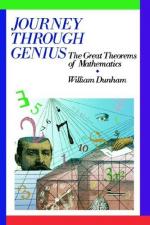
|
| Name: _________________________ | Period: ___________________ |
This quiz consists of 5 multiple choice and 5 short answer questions through Heron's Formula for Triangular Area.
Multiple Choice Questions
1. Which of the following becomes an important definition in mathematics that was first presented in Elements?
(a) Parallel line.
(b) Circle.
(c) Intersection.
(d) 180 degree angle.
2. What did Euclid state about pi in Elements?
(a) The proportion of area to circumference is never equal.
(b) There is no relationship between the area of a circle and its circumference.
(c) There is a constant relationship between the area of a circle and the square of its diameter.
(d) The proportion of diameter to area is never equal.
3. Which of the following was NOT true about Archimedes, according to Dunham?
(a) His death was described as being by the hands of a Roman invader.
(b) Archimedes died because he refused to follow orders until he completed a math problem.
(c) He died during the fall of Syracuse.
(d) He died as a soldier.
4. What was known about pi, during Archimedes' time?
(a) That is was the relationship between the diameter and circumference of a circle.
(b) That it was never the same number value for a given circle.
(c) Nothing, the concept of pi was unknown.
(d) That it could not be assigned a relationship between measurements in a circle.
5. In Elements, how many postulates must be accepted as given?
(a) Twenty-two.
(b) Eighteen.
(c) Five.
(d) Twelve,
Short Answer Questions
1. Which of the following was one of Euclid's great theorems?
2. After working on pi, what did Archimedes continue with in his study of mathematics?
3. After Hippocrates, what shape did the Greeks attempt to square without success?
4. What was the same about Apollonius and Erosthanes?
5. Which of the following was NOT defined by Euclid?
|
This section contains 355 words (approx. 2 pages at 300 words per page) |

|




